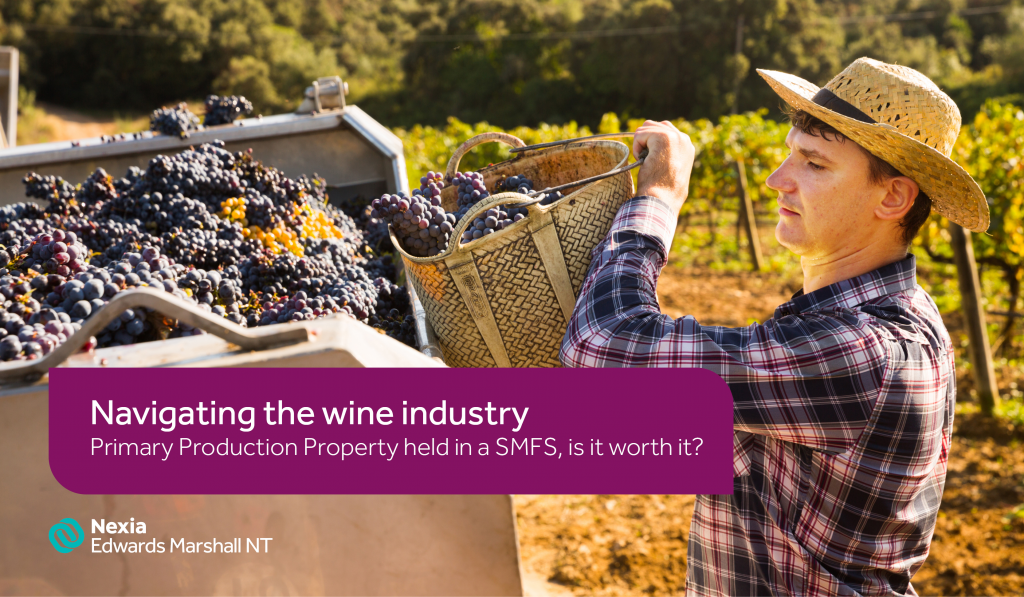Self-Managed Superannuation Funds (SMSF) are governed by the Superannuation Industry Supervision (SIS) rules through the Australian Taxation Office (ATO). An audit must be undertaken every year by an ATO-registered superannuation fund auditor who reports any breaches of the SIS Act on an annual basis.
A SMSF can hold primary production property in the following ways:
- Purchased by the fund directly or;
- Utilising a limited recourse borrowing arrangement (LRBA) with the title held in a custodian trust until paid off. The funds can be lent to the super fund by a related party, LRBA, or financial institution that offers this facility.
There are substantial rules and costs for having an LRBA in a SMSF, and this needs to be considered upfront. The loan must be for a single acquirable asset limiting development on the property.
Business real property is the only form of property that can be transferred from a related party owner into a related SMSF.
The property would be purchased by the fund either from a third party or a related party on commercial terms. A transfer from a related party would require a valuation prior to any transfer to determine the market value of the title(s) being transferred and the expected market rent. The arms-length requirement means the rental arrangement will need to be on an arms-length commercial terms.
It can be beneficial to have business real property held in an SMSF as the fund is concessionally taxed at 15% whilst the members are in the accumulation phase. Later, the rent income could be tax-exempt if the members are in the retirement pension phase. If the business is a related party renting the land, they could be claiming the rent deduction at potentially a higher tax rate.
The fund trustees and related parties can live on residences on the farm provided rent is being paid on commercial terms and the residential area is not more than two hectares (five acres). The ATO requires that the main use of the land must be in an ongoing primary production business.
Other benefits include
- Farming land is often on multiple titles, so ease of potentially moving one or more titles but potentially not the whole farm into the SMSF on an affordable basis;
- Asset protection, keeping the land title(s) away from other entities or individuals running the business;
- A worthwhile way of freeing up cash held in the super environment that can come out of the SMSF to pay for the purchase and pay off debt outside the SMSF.
- Potential stamp duty exemptions on the SMSF purchasing the property in South Australia and
- Land tax benefits as SMSFs are not grouped with other properties held in the family group, although they may receive exemptions from land tax as primary production land regardless.
Other considerations members would need to consider
- Due to potential capital gains tax (CGT) on selling the title(s) to the SMSF from the current owners if related parties, there is potential for the use of small business CGT concessions if available;
- Once owned in the SMSF, members of the fund would need to consider that the rent must be paid on commercial terms;
- The asset must be included within the investment strategy for the SMSF and meet the sole purpose test of a SMSF in providing retirement benefits to its members;
- How the land ultimately comes out of the SMSF if a member dies and the spouse maybe unable to retain the whole property within the fund. An issue may also arise if a deceased member had a binding nomination to adult children or the legal personal representative, both being unable to retain the member’s benefit within the fund.
Ultimately, there is a lot to consider, but primary production land used by a related party business can be a very worthwhile investment in an SMSF.
Next steps
Choosing the best approach may be overwhelming. Speak with your local Nexia Edwards Marshall NT Advisor today to identify and manage any potential risks your business might face. We can help you establish effective risk management plans and procedures, allowing your business to continue to reach its full potential without interruption.



